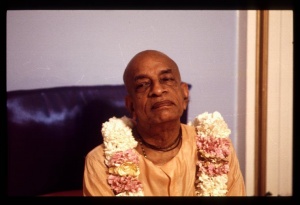CC Madhya 4.59 (1975): Difference between revisions
(Vanibot #0027: CCMirror - Mirror CC's 1996 edition to form a basis for 1975) |
(Vanibot #0020: VersionCompareLinker - added a link to the Version Compare feature) |
||
| Line 2: | Line 2: | ||
<div style="float:left">'''[[Sri Caitanya-caritamrta (1975)|Śrī Caitanya-caritāmṛta (1975)]] - [[CC Madhya (1975)|Madhya-līlā]] - [[CC Madhya 4 (1975)|Chapter 4: Śrī Mādhavendra Puri's Devotional Service]]'''</div> | <div style="float:left">'''[[Sri Caitanya-caritamrta (1975)|Śrī Caitanya-caritāmṛta (1975)]] - [[CC Madhya (1975)|Madhya-līlā]] - [[CC Madhya 4 (1975)|Chapter 4: Śrī Mādhavendra Puri's Devotional Service]]'''</div> | ||
<div style="float:right">[[File:Go-previous.png|link=CC Madhya 4.58 (1975)|Madhya-līlā 4.58]] '''[[CC Madhya 4.58 (1975)|Madhya-līlā 4.58]] - [[CC Madhya 4.60 (1975)|Madhya-līlā 4.60]]''' [[File:Go-next.png|link=CC Madhya 4.60 (1975)|Madhya-līlā 4.60]]</div> | <div style="float:right">[[File:Go-previous.png|link=CC Madhya 4.58 (1975)|Madhya-līlā 4.58]] '''[[CC Madhya 4.58 (1975)|Madhya-līlā 4.58]] - [[CC Madhya 4.60 (1975)|Madhya-līlā 4.60]]''' [[File:Go-next.png|link=CC Madhya 4.60 (1975)|Madhya-līlā 4.60]]</div> | ||
{{CompareVersions|CC|Madhya 4.59|CC 1975|CC 1996}} | |||
{{RandomImage}} | {{RandomImage}} | ||
==== TEXT 59 ==== | ==== TEXT 59 ==== | ||
| Line 32: | Line 31: | ||
<div class="purport"> | <div class="purport"> | ||
In the Hari-bhakti-vilāsa ( | In the Hari-bhakti-vilāsa (sixth vilāsa, verse 30) it is stated that the Deity should be bathed in water mixed with yogurt and milk, accompanied by the sounds of conchshells, bells and other instruments and the chanting of the mantra oṁ bhagavate vāsudevāya namaḥ, as well as the chanting of the Brahma-saṁhitā verses beginning cintāmaṇi-prakara-sadmasu kalpa-vṛkṣa-lakṣāvṛteṣu surabhīr abhipālayantam. | ||
</div> | </div> | ||
Latest revision as of 17:51, 27 January 2020

A.C. Bhaktivedanta Swami Prabhupada
TEXT 59
- tulasī ādi, puṣpa, vastra āila aneka
- āpane mādhava-purī kaila abhiṣeka
SYNONYMS
tulasī—tulasī leaves; ādi—and others; puṣpa—flowers; vastra—garments; āila—arrived; aneka—in great quantity; āpane—personally; mādhava-purī—Śrī Mādhavendra Purī; kaila—executed; abhiṣeka—the bathing of the Deity at the beginning of the installation ceremony.
TRANSLATION
The villagers brought a large quantity of tulasī leaves, flowers, and various kinds of garments. Then Śrī Mādhavendra Purī personally began the abhiṣeka [bathing ceremony].
PURPORT
In the Hari-bhakti-vilāsa (sixth vilāsa, verse 30) it is stated that the Deity should be bathed in water mixed with yogurt and milk, accompanied by the sounds of conchshells, bells and other instruments and the chanting of the mantra oṁ bhagavate vāsudevāya namaḥ, as well as the chanting of the Brahma-saṁhitā verses beginning cintāmaṇi-prakara-sadmasu kalpa-vṛkṣa-lakṣāvṛteṣu surabhīr abhipālayantam.